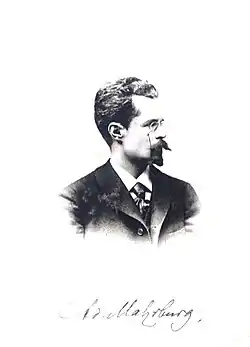
Adam Mahrburg
Adam Mahrburg (6 August 1855 – 13 November 1913) was a Polish philosopher—the outstanding philosophical mind of Poland's Positivist period.[1]
Life
Adam Mahrburg was a philosopher and theoretician of knowledge. He taught in Warsaw's secret university and published in learned and popular journals.[2]
He reduced philosophy to the theory of knowledge. He regarded science as a tool for ordering and anticipating phenomena and for effective action. He was an exponent of determinism.[2]
Works
- Teoria celowości ze stanowiska naukowego (The Theory of Purpose from a Scientific Standpoint, 1888),
- Co to jest nauka (What Is Science? 1897)
See also
Notes
References
- "Mahrburg, Adam," Encyklopedia Powszechna PWN (PWN Universal Encyclopedia), Warsaw, Państwowe Wydawnictwo Naukowe, vol. 2, 1974, p. 818.
- Jan Zygmunt Jakubowski, ed., Literatura polska od średniowiecza do pozytywizmu (Polish Literature from the Middle Ages to Positivism), Warsaw, Państwowe Wydawnictwo Naukowe, 1979, ISBN 83-01-00201-8.
- Władysław Tatarkiewicz, Historia filozofii (History of Philosophy), volume 3: Nineteenth-Century and Contemporary Philosophy, Warsaw, Państwowe Wydawnictwo Naukowe, 1978, p. 178 and passim.
External links
- Mahrburg Adam, Pisma filozoficzne, Tom 1 (Adam Mahrburg, Philosophical Writings, volume 1)
This article is issued from Wikipedia. The text is licensed under Creative Commons - Attribution - Sharealike. Additional terms may apply for the media files.